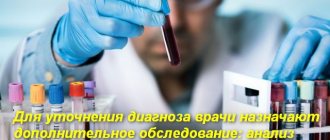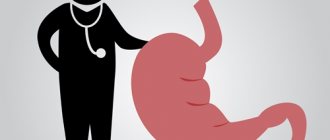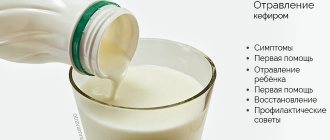The time of bearing a baby is a time of close attention to one’s own health, a time when the expectant mother approaches the issue of diet with particular passion. This concerns not only the quantity, but also the quality of the products consumed as food, and is absolutely correct: any product that is in the slightest degree not entirely suitable for consumption can cause at least an unpleasant, at most quite dangerous, condition. We are talking about poisoning during pregnancy, which can cause many bitter moments for the expectant mother and cause natural concerns about the health of the growing baby.
In principle, any product can cause poisoning during pregnancy, but doctors call sausages, dairy products, meat, perishable sweets (for example, cakes with cream), canned food, and salads dressed with mayonnaise the most dangerous in this regard. Mushroom poisoning during pregnancy is also dangerous - in this case, toxins can penetrate to the child through the placenta. Fortunately, such cases are rare in medical practice, but, nevertheless, it is better to be doubly careful with mushrooms while expecting a baby.
Question: poisoning or pregnancy?
The site provides reference information for informational purposes only.
Diagnosis and treatment of diseases must be carried out under the supervision of a specialist. All drugs have contraindications. Consultation with a specialist is required! Hello, I went to McDonald's on February 13th,
On February 14, I woke up and had a heaviness in my stomach, took my temperature, it was 37 and 2, I went to work, we were moving there and were carrying our things here and there, and my stomach began to hurt and my body ached as if I had a fever. at lunch I went to the dining room... while I was standing in line I felt like I had stomach cramps... I could barely stand. I couldn’t look at the food, so I didn’t touch the food at all. At 4 p.m. I took time off from work because I was feeling sick and as if I wanted to throw up, there were colics in my stomach and my body was aching... while I was on the subway, I barely made it there, it was hard to stand... I felt nauseous.
I came home and went straight to bed.. I woke up and vomited a lot. but the condition did not improve, I still felt sick. I drank water with lemon and vomited again. an hour later I decided to do a gastric lavage with potassium permanganate. drank and vomited, drank and vomited. Well, I think it will be easier anyway. I even decided to eat soup. but that was not the case... I vomited again. then I had diarrhea...after drinking water I vomited again. and I already went to bed without eating anything.
On February 15, I decided to call a general practitioner. There was no more vomiting that day. I had diarrhea twice in the morning. When I'm lying down I feel fine. I start sitting at the computer and start to feel nauseous...but don’t vomit.
The doctor came, I told her everything...she thought I might have appendicitis. she touched my stomach... it didn’t seem to hurt anywhere. At the same time, she didn’t prescribe anything for me at all, I myself already asked if I could drink tea with crackers and drink charcoal, she said yes..
At night I had diarrhea with water 2 times. and I took IMODIUM and this morning my stomach is GRUMBLING all the time. and constantly. and starts to feel a little nauseous. Yesterday I only ate a little crackers and tea...and this morning too.
1.) what's wrong with me? Did I really get poisoned in Magdak? Or is it appendicitis? or is it possible that THIS IS PREGNANCY? it is possible that it is pregnancy.
2) what can I eat and drink?
3) and after I recover, I need to drink bifiorm for my stomach to restore it and vitamins to strengthen it.
SORRY FOR SUCH A HUGE MESSAGE AND PLEASE ANSWER ALL MY QUESTIONS. THANK YOU
The symptoms you described are very consistent with food poisoning. You need to consult a gastrologist or infectious disease specialist. It is necessary to take a general blood test and stool test for the intestinal group. You may need to start taking antibacterial agents (Enterofuril or Biseptol). Taking immodium is contraindicated in case of food poisoning, because This drug inhibits peristalsis and slows down the removal of toxins from the body. You need to drink more fluids (Regidron).
thank you very much for your answer.. 1) tell me, is it necessary to take tests? Isn’t it possible to heal like this?
2)Can I drink coal? Will it help with poisoning (which I wrote about above) and how many pieces a day should I drink?
3) you still haven’t written what I can eat now? and is it possible to eat boiled chicken?
4) and should I take bifiform and alphabet vitamins when I recover?
thanks for the answers earlier
Activated carbon can be taken in a daily dosage of 1 t. per 10 kg of weight. Tests for pathogenic flora must be done. It is advisable to refrain from eating meat for another 2-3 days.
hello, it’s me again.. the one who was poisoned wrote to you above.. today I went to the doctor, he didn’t tell me to do any tests. I’m better now, no vomiting or diarrhea... I’m just not eating very well yet.
tell me that it’s better for me to drink LINES or BIFIFORM to restore intestinal microflora. after all, due to the poisoning, the microflora was probably disrupted
To restore the microflora, bifiform has proven itself well, but you must first undergo a course of antibacterial therapy (Enterofuril), as well as take enzyme preparations with meals (Pangrol, Creon 10,000). Follow the diet for 7 days.
and be sure to undergo a course of antibacterial therapy (Enterofuril). and Pangrol, Creon 10.000)? But if you don’t take this and drink only bifiform, then what will happen then?
In case of poisoning, the entire gastrointestinal tract is affected; enzyme replacement therapy is prescribed to normalize pancreatic function, just as probiotics are prescribed to normalize the microflora. You may not take antibacterial therapy, then the period of convalescence will be longer, and also if you still have pathogenic flora that caused poisoning, then the process may be delayed. You need to consult with an infectious disease doctor to decide on the need for antibacterial treatment.
Tell me, how long after poisoning can you drink alcohol and what kind of alcohol is the gentlest? beer? or wine? or maybe kakteli? I was poisoned on February 14th and maybe I’ll drink on February 26th at my birthday
How to avoid illness - preventive measures
Digestive ailments in the second trimester, first or last, always significantly affect the well-being of a woman and her unborn child. Therefore, try to avoid such a situation during the period of bearing a child. A woman already suffers from toxicosis or a feeling of nausea, and if poisoning is added to this, then the situation only gets worse.
But some preventive measures aimed at preventing gastrointestinal problems
- You need to carefully select foods and eat only proven food. You should not make purchases at markets or from hand, especially if you cannot check their expiration date, production date and under what conditions the goods were stored.
- It is imperative to observe the rules of personal hygiene. When planning a pregnancy, you need to understand that for some period you will have to toughen your attitude towards your hygiene. Hands should be washed every time before eating, as well as when cooking and after visiting public places.
- It is necessary to store food correctly . Otherwise, a violation of the temperature regime and food proximity can cause food poisoning in the early stages. It is not recommended to store prepared foods next to raw foods.
- Products must be thoroughly cooked, especially for meat and fish products. Many products contain parasitic microorganisms that, if not properly processed, can cause problems such as vomiting and diarrhea.
- Keep your living area clean, especially the kitchen. Sometimes residues of detergents can provoke food intoxication in the later stages.
- It is necessary to avoid those foods that have a high risk of poisoning. These are mushrooms, dried and fresh fish, exotic fruits. Sometimes poisoning occurs with persimmons, avocados, and mangoes.
- Caution must also be exercised when visiting warehouses and production facilities at an enterprise where carbon monoxide poisoning can occur.
Types of toxicosis and their differences from food poisoning
There are several types of toxicosis, the symptoms of which we will consider below. We will also find out how they differ from food poisoning.
Toxicosis with acute adrenal insufficiency
This type of toxicosis is usually caused by the main causative agent of meningococcal infection - this is a disease that occurs in the form of infectious inflammation of the membranes of the brain and spinal cord (meningitis) or inflammation of the mucous membranes (nasopharyngitis).
- increased body temperature, sometimes reaching 40 °C;
- pronounced pale skin tone;
- the appearance of a “star rash” - against the background of pale skin, bright areas of red and cherry rash that resemble scattered stars;
- feeling lethargic, tired and lethargic;
- breathing disorder – frequent, arrhythmic, superficial;
- Possible bloody vomiting.
Differences from food poisoning
- Poisoning is not accompanied by the appearance of red spots on human skin.
- Food poisoning usually does not cause a rash.
- Food poisoning does not cause such a high fever.
Toxicosis with liver failure
Usually caused by a viral disease in children under three years of age. At the initial stage it occurs as an acute respiratory viral infection or an intestinal infection.
- drowsiness;
- convulsions;
- profuse vomiting;
- high body temperature;
- cloudiness of consciousness;
- breathing becomes fast and deep;
- enlarged, painful liver.
The difference between such toxicosis is compaction and enlargement of the liver. Toxicosis with liver failure can lead to coma.
Differences from food poisoning
- If the urge to vomit is also accompanied by the occurrence of convulsions, then you are dealing with toxicosis.
- Toxicosis in the first stages proceeds in much the same way as ARVI.
- Although there is no jaundice, the liver is enlarged and dense.
Toxicosis with acute renal failure
Usually accompanied by anemia (lack of iron in the blood) or thrombocytopenia (decreased platelet count, causing poor blood clotting and wound healing);
The most common causes of toxicosis are:
- respiratory viral infections;
- gastroviral infections;
- vaccination.
- the appearance of swelling in the nose, eyes and lips;
- abdominal pain;
- vomit;
- a decrease and then a gradual increase in blood pressure;
- the appearance of shortness of breath and many others.
This type of toxicosis leads to disorders in the cardiovascular system. Most often, it can be confused with food poisoning. May cause normochromic anemia, thrombocytopenia (decreased platelet count).
Differences from food poisoning
- Food poisoning can cause jaundice in the skin in very rare cases, but most often this symptom is a sign of this type of toxicosis.
- With food poisoning, there are no nasal hemorrhages, which, in turn, often occurs with this type of toxicosis.
Toxicosis during pregnancy
Most often occurs in the first trimester of pregnancy. When it appears in the last months of pregnancy, it becomes more dangerous than in the early stages. Divided into three different degrees.
- First degree. Symptoms: rare nausea (no more than 5 times a day), most often provoked by strong odors of food products.
- Second degree. Symptoms: the number of gagging, ending in vomiting, increases to 10–15 times a day. Sudden weight loss (sometimes up to three kilograms) and increased heart rate.
- Third degree. Symptoms: vomiting occurs up to 20–25 times a day, which can be triggered by any movement. High heart rate, body temperature rises to approximately 37 °C.
Consequences of intoxication
Complications and consequences appear during the period of bearing a child, but can make themselves felt in the future. Mushroom poisoning is extremely dangerous. In this case, the fetus develops with severe pathologies, and for a woman this condition can even be fatal.
A severe eating disorder in the early stages can provoke an interruption in the process of bearing a child.
A woman may also face the following consequences:
- spontaneous miscarriage;
- delayed development of the fetus in mental and physical terms;
- disorders in the blood composition;
- weak heart function;
- fetal hypoxia.
In addition, food intoxication at any month can cause pregnancy to fail. When this situation happens in the 3rd trimester, there are very real reasons for concern. Severe intoxication in some cases leads to premature birth, placental insufficiency, and pathologies in the development of the child.
You can understand how the disease affects a child by the fact that there is a discrepancy between his height and weight by the due date. This phenomenon also has a negative impact on the woman’s body. But the signs and subsequent consequences will depend on the degree of intoxication. Serious consequences arise with the development of botulism, when paralysis of the respiratory organs and death of the mucous membrane of the small intestine can occur. And if comprehensive medical care is not provided, the risk of death increases.
Poisoning with paint or some other toxic substance can cause toxic shock. And in this case, first aid is necessary. Otherwise, in the future you may encounter disturbances in normal blood circulation, complications from pneumonia and acute renal failure. The same applies to mercury intoxication.
The danger in the second or third trimesters lies not only in the intoxication itself, but also in the dehydration of the female body, which occurs due to constant vomiting and diarrhea. And this gradually leads to the formation of blood clots. Due to the large loss of fluid, minerals and important salts are washed out of the body. As a result, water-salt metabolism is disrupted. And this results in consequences for the fetus, whose development slows down significantly.
As for the woman herself, this is fraught with the onset of premature labor. However, if treatment is organized in a timely manner and toxic substances do not have time to penetrate the circulatory system, then many complications can be avoided.
How to generally distinguish toxicosis from food poisoning
To summarize, I would like to draw your attention to how to generally distinguish toxicosis and poisoning.
First of all, it should be remembered that toxicosis does not cause diarrhea. This is a very rare occurrence. Do not rush to begin treatment for food poisoning if you do not feel cramps and pain in the abdomen, and a strong smell or even the sight of food causes you to vomit. These are the main signs of toxicosis, not food poisoning.
However, we should not forget that toxicosis in acute liver failure can also cause abdominal cramps, but you can safely reject the suspicion of food poisoning if you experience swelling of parts of the face, pressure surges, shortness of breath and many other symptoms described above. You need to know the differences between these diseases so as not to confuse them. Consult with specialists, they will help you professionally understand what exactly is happening to your body.
In most cases, poisoning of the body does not entail serious consequences. But for a pregnant woman this is a rather dangerous condition, which is accompanied by the development of systemic intoxication. These patients become dehydrated due to frequent vomiting and persistent diarrhea. Pathogenic microorganisms in case of poisoning can cause harm to the fetus, which can result in premature termination of pregnancy . In this regard, it is important to promptly identify poisoning or toxicosis in a woman. For diagnosis, it is necessary to know the symptoms of these pathological reactions.
The peak of poisoning, as a rule, occurs in the summer, when high air temperatures shorten the shelf life of food products. But toxicosis is diagnosed in 30% of pregnant women in the first trimester (1-14 weeks of fetal development). And late intoxication is diagnosed in 20% of clinical cases.
Prevention
Most food poisoning and unpleasant consequences can be prevented if you follow simple rules for processing and preparing food:
- Purchase products only from trusted stores, require quality certificates for seafood, meat and fruits.
- Thoroughly wash all purchased goods immediately after purchase, including cans and citrus fruits.
- Follow the storage requirements for prepared foods and ensure that the temperature in the refrigerator is maintained.
- Do not forget about the rules for the proximity of products on the same shelf.
- During pregnancy, exclude any mushrooms, undercooked meat or raw fish or sausages from the menu.
The expectant mother should wash her hands more often, treat cutting boards and knives with boiling water, and select a set of dishes for personal use. To prevent dangerous poisoning, it is better to take care of your health, adhere to small restrictions and pamper yourself only with healthy foods.
What is toxicosis
Toxicosis is a chronic intoxication of a woman’s body with toxins that are formed during fetal development. The main manifestations of the disease are nausea and vomiting. There are three degrees of toxicosis:
- The patient experiences up to 5 urges to vomit during the day and a slight loss of body weight (up to 3 kg).
- Up to 10 vomiting attacks and signs of a significant decrease in body weight (3-4 kg in two weeks).
- The woman feels constant nausea and high frequency of vomiting. Body weight can decrease to 10 kg. Many women experience an increase in body temperature and heart rate.
Toxicosis in pregnant women can develop from the first days of pregnancy or from 5-6 weeks . But all pathological signs, as a rule, disappear after 14-15 weeks.
Reasons for the development of toxicosis
In pregnant women, early toxicosis develops for a number of reasons:
- Hormonal changes in the body. After fertilization of an egg, a woman’s hormone composition changes dramatically, which provokes sudden changes in mood, attacks of nausea, and vomiting. In this case, the pregnant woman’s condition normalizes at 14-15 weeks.
- Formation of the placenta. The process of placenta development is accompanied by chronic intoxication, which ends at the end of the first trimester of pregnancy.
- Defensive reaction. Many experts argue that toxicosis is a specific protective reaction. In this way, the woman’s body is protected from toxic foods that can harm the baby. As a result, nausea and vomiting may develop due to certain food ingredients.
- Chronic infectious diseases . The presence of a bacterial infection in a woman is considered a predisposing factor to early toxicosis.
- Changes in the psychological sphere. Emotional turmoil and frequent stressful situations are considered to be the cause of the body's toxic reaction in the third trimester.
- Age factors. According to statistics, toxicosis is more often found in pregnant women over 35 years of age.
- Genetic predisposition. Often this condition occurs in several generations of women.
- Multiple pregnancy. In patients with multiple pregnancies, late toxicosis is observed.
Recovery period after poisoning
In the first days after poisoning, it is advisable for a pregnant woman to remain in bed, excluding possible unrest and emotional turmoil . It is very important to adhere to a therapeutic diet (you should never go hungry!). For the first 2-3 days it will be vegetable puree soups, lean meat broths, brown bread crackers. Then stewed and boiled vegetables and light porridges are introduced (rice is especially useful). For about a week after poisoning, you should not eat meat, fish, raw fruits and vegetables.
In the first couple of days after poisoning, it is good for the expectant mother to eat vegetable puree soups, low-fat meat broths and crackers
After complete recovery, it is good for the expectant mother to drink a vitamin and mineral complex. Berry fruit drinks rich in vitamins will also be useful.
It is better not to eat spicy, fatty, smoked and fried foods at all during pregnancy.
Clinical picture of acute poisoning
The most common type of poisoning is food intoxication . Consumption of low-quality and expired food products causes the following clinical picture in the patient:
- acute diarrhea with loose stools and flatulence;
- intense nausea and single attacks of vomiting;
- pain and burning sensation in the stomach and intestines;
- symptoms of systemic intoxication in the form of dizziness, general weakness, headache, increased body temperature.
Causes of food poisoning
Along with low-quality or expired food products, pathogenic bacteria and microorganisms can enter the patient’s body. The following are some foods that can cause poisoning:
- Vegetables and fruits are the most common cause of poisoning, especially in the summer. These products may contain large amounts of pesticides and other toxic chemicals . Such ingredients, if storage and transportation conditions are violated, cause poisoning of the body.
- Meat. This product exhibits toxicity if storage rules are not followed. Under such conditions, pathogenic bacteria actively multiply on the surface of meat products.
- Fish. Poor storage and heat treatment are considered the main causes of poisoning in fish products.
- Mushrooms. In such cases, the most severe poisoning occurs.
- Dairy products. Long-term storage of such products causes staphylococcal intoxication.
What foods can cause poisoning during pregnancy?
Despite the fact that a woman monitors the food entering her body during pregnancy, it can be difficult for her to deny herself this or that food when the body begins to require it. As a result, a variety of foods appear in the diet.
Intoxication or stomach upset can be caused by:
- canned fish and meat;
- mushrooms;
- salads (especially store-bought ones) dressed with mayonnaise or sour cream sauce;
- almost all fermented milk products;
- cottage cheese and milk;
- sushi and rolls;
- semi-finished products;
- sausages and meat products;
- eggs and seafood;
- confectionery baked goods (pastries, cakes) with a cream layer.
In addition, you need to understand that during pregnancy, even familiar and quite healthy products can also be dangerous if they are not stored correctly and if they are consumed after the expiration date has already expired. In such food, pathogenic bacteria begin to multiply, which then provoke intestinal dysfunction and contribute to the accumulation of toxic substances inside the body.
As for the listed products that pose a danger, there are also some nuances here. The degree of damage to organs from fungi will depend on whether they are a source of radiation and intoxication. The meat may already be pre-contaminated with a bacterial infection, which cannot be completely removed even under the influence of high temperatures. Some fruits, berries and vegetables can also cause upset if they are not stored correctly. And so that a woman can protect herself in the early or late stages, care must be taken with such products, regardless of the method of their preparation.
Signs of poisoning in pregnant women
Poisoning can be distinguished from pregnancy by the clinical picture of the disease. When the body is poisoned, a woman gradually develops general weakness, nausea, and bouts of vomiting, which progress to diarrhea . Significant intoxication is accompanied by hyperthermia (38-39 ⁰C) and chills. Thus, there are the following key symptoms of poisoning:
- decreased blood pressure, general malaise and dizziness;
- acute nausea and sudden attacks of vomiting;
- constant flatulence and diarrhea;
- gradual increase in body temperature.
All of the above symptoms may bother the patient individually or in combination. Thus, minor poisoning can occur without an increase in body temperature and attacks of vomiting . Mild intoxication, as a rule, goes away after a few days and does not require the woman to be hospitalized in a hospital.
The main distinguishing features of poisoning and toxicosis
The key difference is the sudden onset of food poisoning. During the first few hours, the patient experiences increasing symptoms of nausea, dizziness, vomiting and abdominal pain. The average period of time from the use of a toxic substance to the development of signs of poisoning is 1-12 hours .
Unlike the symptoms described above, toxicosis has a smooth onset and a gradual increase in signs of intoxication. Attacks of nausea and vomiting primarily bother a woman in the morning and are not accompanied by a rise in body temperature. At the same time, the question of how to distinguish poisoning from toxicosis can be answered by the absence of chills and diarrhea in a pregnant woman.
Problems with stool and headaches in pregnant women, which aggravate the diagnosis, can be observed only in the later stages . But they are considered a natural reaction of the body to prepare for labor.
Experts still do not recommend self-diagnosis. In each case, a woman needs to consult a doctor who will make a diagnosis and prescribe an adequate course of treatment.
General recommendations for pregnant women in case of poisoning
If signs of food poisoning are detected, the patient should follow the following rules:
- Drinking large amounts of liquid. At the same time, a pregnant woman is recommended to drink water often and in small sips . You should not artificially induce vomiting. During this period, it is advisable to use a drug such as rehydron. This pharmaceutical product is available in powder form. It restores electrolyte balance lost due to dehydration. The use of rehydron is also permitted for pregnant and lactating women.
- Refusal of fatty and high-calorie foods. A gradual restoration of the usual diet occurs after the cessation of vomiting and improvement in general well-being. During the recovery period, the patient is recommended to adhere to a gentle diet.
- After the urge to vomit stops, the woman is recommended to take sorbents. These pharmaceutical drugs absorb all the toxins in the gastrointestinal tract. Such medications include smecta, polysorb, activated carbon and enterosgel. The choice of remedy is made after consultation with the attending physician.
- In case of severe poisoning, the patient must be urgently hospitalized. Only in a medical hospital can specialists eliminate intoxication of the body and maintain pregnancy .
Toxic reactions of the body to pregnancy or food poisoning require a professional medical approach to diagnosis and treatment.
Treatment
If the poisoning is severe enough and is accompanied by a severe general condition, uncontrollable vomiting, and high fever, then the woman must be hospitalized. In the hospital, she will be cleansed of toxins from her body (usually through IVs), and if necessary, antibiotics will be prescribed (they are selected carefully, taking into account safety for the fetus).
In case of a mild form of poisoning, the patient also needs to take certain medications, but they can be taken at home.
Drug therapy for mild forms of poisoning
- Enterosorbents that absorb toxins and remove them from the body naturally. This is the well-known activated carbon, as well as Smecta, Enterosgel, Polysorb, etc.
- The antiseptic drug Enterofuril, which has an effect similar to an antibiotic, is also allowed for pregnant women. The product helps with intestinal infections, destroying pathogenic microorganisms (salmonella, E. coli, staphylococcus, etc.). Enterofuril eliminates nausea and stops diarrhea. The medicine is almost not absorbed into the blood, so it cannot harm the fetus.
- The preparations Regidron, Hydrovit or Normohydron will replenish the water-salt and acid-base balance in the body. By the way, you can prepare a similar solution yourself using simple ingredients: water, salt, sugar and soda (2 tablespoons of sugar are dissolved in 0.5 liter of boiled water, then 0.25 teaspoon of salt and the same amount of soda are added, volume ingredients may vary slightly).
Photo gallery: drugs allowed for pregnant women in case of poisoning
Activated carbon is a natural sorbent that absorbs toxins
Regidron will replenish the loss of fluid and mineral salts in the body
Enterofuril will eliminate nausea, diarrhea and destroy pathogenic microorganisms
Traditional recipes for the treatment of food poisoning
Traditional recipes can be used only in case of mild poisoning in a pregnant woman: but not as first aid measures, but as subsequent treatment. In severe cases, this can only be an addition to drug therapy.
- Dill decoction. It will help remove toxins and reduce the urge to vomit. Add 1 glass of water to 1 teaspoon of seeds. Boil the mixture for 15 minutes.
- Lemon juice with added sugar. Take 1 teaspoon for 0.5 lemon; it is better to dilute the composition with warm water. The drink should be divided into 2 or 3 daily doses. The fruit has anti-inflammatory properties; its acid fights viruses and bacteria. However, this recipe is contraindicated for women with gastritis (high acidity) and other gastrointestinal diseases.
- Strong black tea of high quality. The tannins in the drink help stop diarrhea. The drink can be consumed with dried black bread.
- Herbal teas with chamomile or mint. They have anti-inflammatory properties and have a beneficial effect on the digestive system.
- Honey. Has an antibacterial effect. You can use it in its pure form (slowly dissolve 1 teaspoon 3 times a day) or add it to tea.
Folk remedies, for example, dill decoction, will help cope with mild forms of poisoning.










